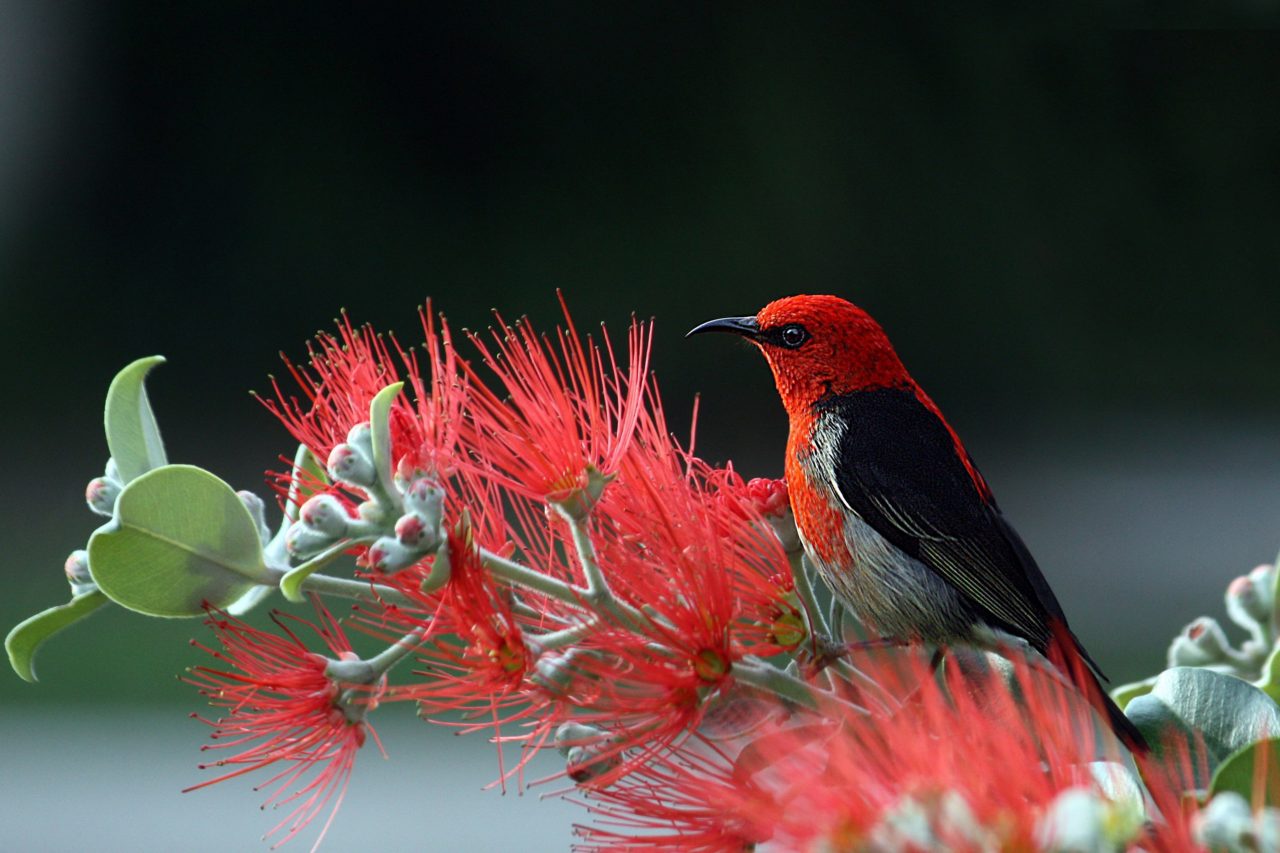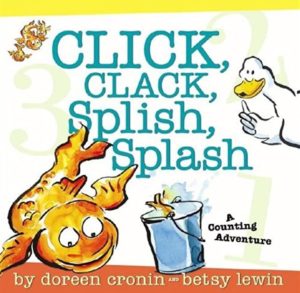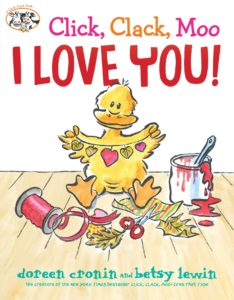 Talk about ending the year strong! This month’s author interview is with bestselling, award-winning author Doreen Cronin, who’s known for (among other things) her Click, Clack series. If you don’t know these books, please remedy that immediately because they are truly first-rate. Here are just a few of my faves from that series:
Talk about ending the year strong! This month’s author interview is with bestselling, award-winning author Doreen Cronin, who’s known for (among other things) her Click, Clack series. If you don’t know these books, please remedy that immediately because they are truly first-rate. Here are just a few of my faves from that series:
Doreen’s also the author of Rescue Bunnies, Bloom, Smick!, and many other books. She currently resides in New York City with her husband, two daughters, and a dog named Buster.
Let’s get on with the interview!
- https://doreencronin.com/
- https://www.facebook.com/DoreenCroninAuthor/
- https://www.instagram.com/cronindoreen/
- https://twitter.com/doreencronin1
RVC: You were lucky enough to receive some very early encouragement from a teacher. What was it, and what did it mean to you?
DC: I was a very quiet, very studious six year old–with a deep fear of speaking up in class. My first-grade teacher, Mrs. Cooper, couldn’t really get me to open up in class, so she started to give me writing assignments. Funny thing is, I didn’t consider them work since they were chances to “speak” in poem, in song, and in stories. She was just brilliant.
After quite a few of these “assignments,” which were really just opportunities to be heard, she said, “Ah, I see now. You’re a writer.”
I didn’t know “writer” could be a job. I’m not even sure I connected it with books, per se, but I knew she was right. “I am a writer.” On the hard days now, I still have to remind myself.
RVC: You took a sidetrack from Mrs. Cooper’s plan for you becoming a writer. You went to St. John’s Law School in the late 1990s and practiced law in downtown Manhattan for a few years. What appealed about that type of career?
DC: The research–and the writing! A career where I get to bury myself in these giant, gorgeously bound law books and analyze cases and then write pages and pages of a position or an argument? That was, at its core, a writing job, and I absolutely loved it.
RVC: How long were you juggling the two careers? Were you writing the entire time you were practicing law?
DC: I wrote so much when I was practicing law. When time is scarce, you make the most of it. And when your brain is going all day, it just doesn’t shut off at night (as we all know.).
Luckily for me, my brain could review documents and read cases and write briefs all day–and many nights and weekends–and then when I got home, she wanted to talk about cows. I let her talk.
RVC: Your dual-career story reminds me a good bit of John Grisham, who also moved from a successful legal career to a successful writing one. How did you know when it was time to stop juggling and take the literary plunge?
 DC: I don’t know how many readers are familiar with the “interoffice envelope,” but it is (was?) a large, manila-type envelope with printed lines of “To” and “From” on front and back, to be re-used over and over again. At the top of the envelope was a deep maroon “paper button” and a string that looped around it (to secure the contents, ha!). The mailroom would drop off piles of these and inside were memos, of course, and briefs you worked on that have now been red-inked to within an inch of their original arguments (and not nearly as kindly as your editor’s remarks. Think “CRONIN, THIS IS NONSENSICAL GARBAGE” as opposed to “I’m not sure what you’re saying here.”).
DC: I don’t know how many readers are familiar with the “interoffice envelope,” but it is (was?) a large, manila-type envelope with printed lines of “To” and “From” on front and back, to be re-used over and over again. At the top of the envelope was a deep maroon “paper button” and a string that looped around it (to secure the contents, ha!). The mailroom would drop off piles of these and inside were memos, of course, and briefs you worked on that have now been red-inked to within an inch of their original arguments (and not nearly as kindly as your editor’s remarks. Think “CRONIN, THIS IS NONSENSICAL GARBAGE” as opposed to “I’m not sure what you’re saying here.”).
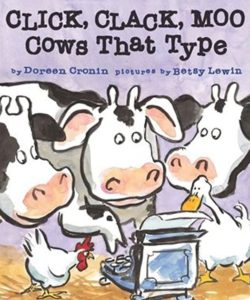 Something happened a few months after Click Clack Moo was published and I would unloop the paper button on the interoffice envelope and letters addressed Doreen Cronin, Author, would spill out. Readers were asking me what Duck was going to do next. And did I visit schools? And what was my favorite color?
Something happened a few months after Click Clack Moo was published and I would unloop the paper button on the interoffice envelope and letters addressed Doreen Cronin, Author, would spill out. Readers were asking me what Duck was going to do next. And did I visit schools? And what was my favorite color?
That’s when I started to think about writing full time. I had lunch with two of my publishing colleagues and asked them if I should quit my day job. They both said “absolutely not.” So, of course, I did, because I don’t like being told what to do.
RVC: Let’s talk about Betsy Lewin. When did you first see the illustrations for Click, Clack, Moo?
DC: Oh, boy, very late in the game. I had never spoken to the art director or to Betsy. I was sent a copy of the sketches (by REAL MAIL, with STAMPS) and I was speechless. I had no idea what any of the characters looked like when I wrote the story. I didn’t even think about what they might look like.
Then I opened my envelope (another big manila one), and there they were.
It felt like they had been born. I actually cried. It was an extraordinary feeling to see them and meet them for the first time. Even if it meant crying alone through a fog of cigarette smoke. (Yes, I quit a long time ago.)
RVC: Why do you think her art works so well with the Click Clack books?
DC: Because she’s brilliant and funny and generous and so is her art. Betsy speaks in pictures and I speak in words and they just work together. Our written story and our illustrated story just understand each other and complement each other. I don’t know how else to explain it.
RVC: How collaborative is the storymaking process between the two of you?
DC: It isn’t! I like to write and then get out of the way.
There have been a few occasions over the years where Betsy will call me and say, “Can we talk about this page? I’m having some difficulty.” On every single one of those occasions, the problem was the text.
RVC: My kids really got a kick out of the Bug Diary series. The first one, Diary of a Worm, came out in 2003. What’s the story of how that book came about?
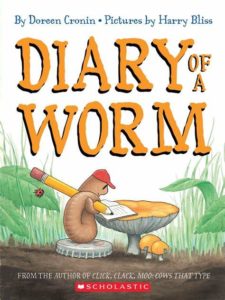 DC: I was trying to write a book about a girl with a really annoying kid brother (hello, autobiography). So when he bothered her, she would call him a pest and then…name the pest. So, “You’re so annoying, you’re like…a worm!” Then kid brother, being full of grit and resilience, would look up the pest and find out what makes the pest “good.”
DC: I was trying to write a book about a girl with a really annoying kid brother (hello, autobiography). So when he bothered her, she would call him a pest and then…name the pest. So, “You’re so annoying, you’re like…a worm!” Then kid brother, being full of grit and resilience, would look up the pest and find out what makes the pest “good.”
Yes, pretty boring.
After about six months of writing that, I wrote a page where the kid brother writes in his journal as a worm, having been hurled that insult by his rude sister (hello, autobiography). After revising and revising that manuscript, that single page was the only page I liked, thus, Diary of a Worm was born.
RVC: I’m glad you stuck with the idea long enough to find the story you intended. Sometimes those things hide forever!
You’ve been fortunate to have earned a lot of honors, awards, and successes for your writing. Which meant the most to you?
DC: The first one, the Caldecott Honor for Betsy and the book for Click Clack Moo. Why? Because I didn’t even know what it was–I was blissfully unaware in the most innocent and ignorant way. Wasn’t aware of the ALA awards, wasn’t aware what was happening on that Monday in January. I had the day off from lawyering and I slept in. When the phone rang, I had absolutely no assumptions about who would be calling.
Ignorance really is bliss sometimes. Once you become aware of it–YOU WANT IT.
RVC: One last question for this part of the interview. You seem to be drawn to animal characters. Which of them do you feel is most like you?
DC: Ha! Duck and Worm. Duck is the side of my personality that has a problem with authority, and Worm is the side of my personality that needs to write to be heard.
RVC: Okey dokey, it’s time to get serious with a capital S—that’s because it’s the Speed Round. Zoomy questions and lickety-split answers, please. Are you ready, Doreen?
DC: Always ready…
RVC: The best place in NYC for bagels? Pizza? Smoothies?
DC: My kitchen! It’s the most boring of answers ever given to the NYC’s best question, but due to an autoimmune condition, I live a dairy-free, gluten-free life. So I make my own GF bagels, GF pizza, and dairy-free smoothies. ALL DAY LONG.
I would like to take this opportunity to plug the enormous, counter-hogging air fryer–because it has transformed my soggy, gluten-free life into a crispy extravaganza!
RVC: On a scale of 1 to 84, how much did you intend Click, Clack, Moo to be a sneaky lesson in collective bargaining?
DC: Ha! ZERO. I thought it was about the power of the written word–and how language changes everything. My then-husband called me a socialist after he read it.
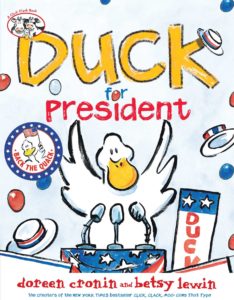 RVC: If Duck ran for President in 2020, what would’ve been his campaign promise?
RVC: If Duck ran for President in 2020, what would’ve been his campaign promise?
DC: 2020–Back the Quack!
RVC: Five words that describe your writing process.
DC: Chaotic, sporadic, hilarious, inspired, tiring.
RVC: What was your favorite picture book of 2019?
DC: I couldn’t possibly!
RVC: Best compliment a child ever gave your books?
DC: Compliments from children make me cry. The best one is probably “I want to be a writer now, too!” Mrs. Cooper strikes again!
The funniest inquiry I ever got was, “Are you okay?”
RVC: Thanks so much, Doreen! We really enjoyed having you swing by to wrap up 2020 in style!

